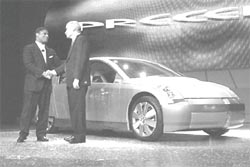Running on hydrogen
 general motors corp ( gm ) recently announced that it had developed a sedan prototype that is powered by fuel cells and is four times as efficient as its current gasoline engines. According to engineers of the company, the fuel cells operate on hydrogen and get the equivalent mileage of 32.25 km per litre of gasoline.
general motors corp ( gm ) recently announced that it had developed a sedan prototype that is powered by fuel cells and is four times as efficient as its current gasoline engines. According to engineers of the company, the fuel cells operate on hydrogen and get the equivalent mileage of 32.25 km per litre of gasoline.
The cells generate electricity by combining hydrogen from the fuel with oxygen from the atmosphere. With the byproducts being heat and water there are no carbon emissions. "This is the technology of the future, although it may be several years before Indian automobile manufacturers adopt the technology," says Anumita Roychowdhury, coordinator of the Right to Clean Air campaign at the Centre for Science and Environment, New Delhi.
In the us , there is increasing pressure on the automakers from government regulators to manufacture vehicles that meet stringent pollution standards. Fuel cells meet the environment criteria as they are cleaner than the other types of power technology like the internal combustion engine. Moreover, these cells show most promise in fulfilling a requirement by California that by 2003 at least 10 per cent of an automobile manufacturer's vehicles sold in the state should produce no air pollution.
Environment concerns and strict pollution standards set by governments across the globe are forcing auto manufacturers to invest in research for a technology that reduces or eliminates carbon-dioxide and other emissions from vehicle engines. Of all the new auto technologies that have come up, fuel cells are fast emerging as the answer to a pollution free vehicle fleet. Already Ballard Power Systems Inc. of Vancouver in British Columbia has declared it will build a plant worth $350 million in two years to produce fuel cells for as many as 300,000 vehicles a year.
The gm sedan prototype has been named Precept fcev and it was unveiled at the North American International Auto Show in Detroit. Designed to perform as well as traditional vehicles, the five-passenger Precept fcev can travel 800 km before its hydrogen tanks need to be refilled, accelerate from zero to around 100 km per hour in nine seconds and start in temperatures below minus 18 centigrade.
Related Content
- Potential and challenges of using hydrogen to decarbonise Indian railways
- Enhancing shift towards Sustainable Freight Transport in Asia and the Pacific: opportunities through railway decarbonization
- CNG to hydrogen-CNG: why switch, and how
- Renewable energy for industry: offshore wind in Northern Europe
- Seeing Future in Fuel Cells, Toyota Ends Tesla Deal
- Gases fom Yamuna harming nearby residents: Malhotra
